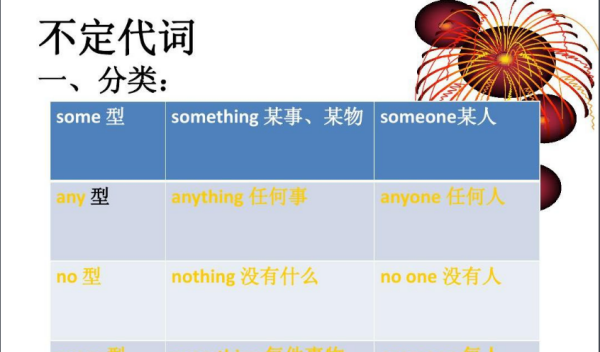本文目录
英语中的不定代词是什么
常用不定代词用法举例
1.some 一些,某些,某个
不定代词some可以代替名词和形容词,常用在肯定句中作主语、宾语、定语等.作定语时,它可以修饰可数名词(单、复数皆可)和不可数名词.例如:
some are doctors,some are nurses.有些人是医生,有些人是护士.(作主语)
2.any一些,任何
不定代词any可以代替名词和形容词,常用在否定句或疑问句中作主语、宾语、定语等.作定语时,它可以修饰可数名词(多为复数)和不可数名词.例如:
there isn’t any ink in my pen.我的钢笔没有墨水.(作定语)
不定代词any有时也可以用在肯定句中,表示"任何的".例如:
you may come at any time;i’ll be home the whole day.你任何时候来都行,我整天都将呆在家里 .
不定代词any也可以用作副词,做状语,表示程度.例如:
is he any better today?他今天好一点了吗?
3.all 全体,所有
不定代词all在句中可以作主语、宾语、表语、定语或同位语.它可以代表或修饰可数名词和不可数名词.代表或修饰可数名词时,指两个以上的人或物.作先行词时,引导词用that.例如:
all were present at the meeting.全都到会了.(作主语,代表可数名词)
4.both 全部,都
不定代词both指两个人或事物.和all一样,可以用作主语、宾语、定语或同位语.例如:
we invited both to come to our farm.我们邀请两个人都来我们的农畅?(作宾语)
5.none 无人或无物
不定代词none的含义和all相反,和no one,not any同义,但其用法相当于名词,在句子中一般作主语或宾语.它代替不可数名词作主语时,谓语动词用单数形式;代替可数名词作主语时,谓语动词用单、复数皆可.例如:
none of the problems is /are easy to solve.这些问题没有一个是容易解决的.(作主语,代替可数名词)
6.either 两者之中的任何一个,这个或那个.
不定代词 either 可以作主语、宾语和定语.例如:
either of them will agree to this arrangent.他们两人中会有人同意这样的安排的.(作主 语)
7.neither 两个之中一个也不是
不定代词 neither 是 either 的否定形式,可以作主语、宾语和定语.例如:
neither is interesting.两个都没有趣.(作主语)
8.each 每个,各自的
不定代词each指每一个人或事物的个别情况,甚至指这些个别情况各不相同.它在句中可以作主语、宾语、定语和同位语.例如:
she gave the children two apples each.她给了每个小孩两个苹果.(作the children的同位语.)
every 每个,每一的,一切的
不定代词every有"全体"的意思,和all的意义相近,但只能作定语.
英语中的不定代词有哪些?
不指明代替任何特定名词或形容词的代词叫做不定代词。常用不定代词有:
some,any,all
,none,both,either,neither,each,
every,other,another,much,
many,few,l
ittle,one等。
一、不定代词的用法
不定代词大都可以代替名词和形容词,在句中作主语、宾语、表语和定语。
1.作主语
both
of
them
are
teachers.他们两人都是教师。
2.作宾语
i
know
nothing
about
this
person.我对这个人一无所知。
3.作表语
this
book
is
too
much
for
a
child.这本书对一个小孩来说太难了。
4.作定语
there
is
a
little
water
in
the
glass.玻璃杯里有一些水。
英语不定代词有哪些
英语的不定代词有
all,
each,
both,
either,
neither,
one,
none,
little,
few,
many,
much,
other,
another,
some,
any,
no,
(a)
few,
(a)
little,
both,
enough,
every
等,以及由
some,
any,
no
和
every
构成的合成代词(即somebody,
anyone,
nothing
等)。在这些不定代词中,多数都能作主语、宾语、表语或定语,但是代词
none
以及由
some,
any,
no
和
every
构成的合成代词只能作主语、宾语或表语,不能作定语,而
no
和
every
则只用作定语。
some(something,somebody,someone),any(anything,anybody,anyone),
no(nothing,nobody,no
one),
every(everything,everybody,everyone,),all,each,both,much,many,(a)little,(a)few,other(s),another,none,one,either,
neither等。 一般来讲,修饰不定代词的词要置于其后。
to
什么是不定代词
不定代词,是英语语法术语,在句中可以作主语、宾语、表语、定语和状语。不定代词是不指明代替任何特定名词或形容词的代词。
常用不定代词有:some(something,somebody,someone),any(anything,anybody,anyone), no(nothing,nobody,no one), every(everything,everybody,everyone),all,each,both,much,many,(a)little,(a)few,other(s),another,none,one,either, neither等。

扩展资料:
不定代词的用法:
不定代词大部分可以代替名词和形容词,在句中作主语、宾语、表语、定语和状语。
1,作主语:
Both of them are teachers.他们两人都是教师。
做主语时谓语动词用复数
2,作宾语
I know nothing about this person.我对这个人一无所知。
3,作表语:
This book is much too difficult for a child.这本书对一个小孩来说太难了。
4,作定语:
There is a little water in the glass.玻璃杯里有一些水。
可以在强调一下a little,little,a few,few的区别:
a little通常带有肯定的意思,表示还有一点;而little带有否定的意思,只剩一点儿了。(little后通常加不可数名词)a few和few同上。(后通常加可数名词)口诀:有a就有(有一点),没a就没有(几乎没有)。
有些不定代词用于指两者(如both,either, neither),有的不定代词用于指三者(如all,any, none, every),注意不要弄混:
Both of my parents are doctors. 我的父母都是医生。
All of the students are interested init. 所有的学生对此都很感兴趣。
There are trees on any side of thesquare. 广场的每一边都种有树。
He has two sons, neither of whom isrich. 他有两个儿子,都不富有。
He has three sons, none of whom is rich. 他有三个儿子,都不富有。
参考资料:百度百科-不定代词
以上就是关于英语中所有的不定代词 ,英语中的不定代词是什么的全部内容,以及英语中所有的不定代词 的相关内容,希望能够帮到您。
